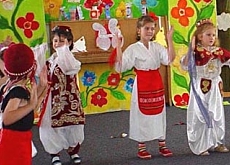
Overcoming prejudices is child’s play

Switzerland is supporting a pioneering nursery school concept in Macedonia which aims to promote tolerance by accepting children from all ethnic backgrounds.
The multilingual “Mozaik” nursery schools educate children aged from three to six in what is the first project of its kind in the racially divided country.
The Swiss Agency for Development and Cooperation (SDC) has been funding the kindergartens, which are in five towns across the country, since 1997.
In addition to financial support – the budget is SFr740,000 ($580,187) for 2004-2006 – it also provides teaching materials.
The Mozaik nursery schools programme in Macedonia is one of a number of projects set up around the world by the international charity, Search for Common Ground (SFCG), with the aim of preventing and resolving conflicts.
Education in Macedonia, even after independence from Yugoslavia in 1991, is still highly segregated and based on the country’s ethnic and linguistic groups.
Macedonians, Albanians, Turks and other minorities tend to have very little contact with each other and when they do, the charity says, it is frequently negative, complicated by prejudice and poor communication.
Ethnic tensions, although they have never exploded into a full open conflict as they did in neighbouring Bosnia or Kosovo, are still present.
Support
The SDC – representing a country which is also multilingual and multicultural – said it decided to support the nurseries as a way of helping to prevent any escalation of the situation in the future.
But the SDC’s Georgette Bruchez says that this was not the only reason. “We also regard the educational aspect of the Mozaik project as very important,” she told swissinfo.
When Macedonia was part of Yugoslavia, children were generally sent to kindergarten to learn how to conform. Parents were expected to work full time in state enterprises, and institutions for children were run on rather rigid disciplinary lines.
Mozaik aims to foster the children’s emotional and social development, as well as teach them tolerance and respect for other cultures.
“We try to emphasise play and movement, adopting an interactive approach which focuses on the children’s needs,” explains Vilma Venkovska, who is responsible for Mozaik’s teaching programmes.
“We make them aware of the linguistic and cultural differences that exist in Macedonia,” she said.
More than language
For the children, learning basic phrases in another language is a game. But Marko Lovrekovic, director of the Macedonian section of SFCG, says that the nurseries’ programme goes further than language.
“Our aim is to combat the prejudices associated with a language. When a Macedonian speaker meets an Albanian speaker in the street, before trying to understand what he is saying he tends to adopt a biased attitude towards him and vice versa,” said Lovrekovic, himself of Croatian origin.
Lovrekovic says the children love coming to the nurseries because they enjoy playing and communicating, often through gestures or music when there is no common language, with children from other ethnic groups.
“When they grow up, they will approach the other ethnic groups in a completely different way from earlier generations,” said Lovrekovic.
Affordable
Owing to the foreign funding of the project, the fees are affordable for most parents and are virtually the same as in state-run nursery schools, at around €20 (SFr31) a month.
The Macedonian government has also given its official blessing to the scheme and has provided accommodation in state-owned premises.
But the SDC says that the future of Swiss aid for the nurseries largely depends on whether the Macedonian Culture Ministry comes up with an official policy for multilingual education.
“For us, the aim is not to create a privileged class of children attending these nurseries,” said Bruchez.
“We want the idea of multilingualism and mutual understanding to be enshrined in national legislation.”
swissinfo, Raffaella Rossello
Macedonia peacefully achieved independence from Yugoslavia in 1991.
But in 2001 tensions over the rights of the Albanian minority, influenced by the situation in neighbouring Kosovo, came to the surface. Timely intervention by the international community prevented a long-term conflict.
The Mozaik nursery schools are intended to help prevent ethnic tensions breaking out in the future. They are currently located in five towns.
Macedonia has been a priority country in the SDC’s programme of cooperation with eastern Europe since 1996.
The SDC has allocated SFr740,000 to the Mozaik programme for the period 2004–2006.
Switzerland, together with Sweden, is the biggest supporter of the project.
In addition to financial support, Switzerland also provides teaching materials.

In compliance with the JTI standards
More: SWI swissinfo.ch certified by the Journalism Trust Initiative



























You can find an overview of ongoing debates with our journalists here . Please join us!
If you want to start a conversation about a topic raised in this article or want to report factual errors, email us at english@swissinfo.ch.